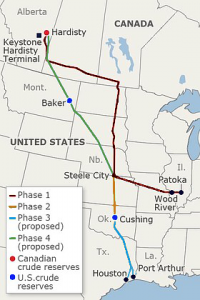I spent last week in Montana and one of the biggest national environmental issues was a frequent topic of conversation – the construction of the Keystone XL pipeline. It will carry tar sands oil from Canada through eastern Montana, south to Nebraska to speed up and improve the transfer of the oil to the refineries in Texas. I don’t have the solution, but discussing it from both a local and national scale is fun.
There is a statement that applies to most environmental discussions and perfectly to the pipeline. “Environmental issues are emotional; the solution is scientific; but the answer is political.”
Adding a new, very large pipeline presents two significant environmental issues that get emotions boiling. One, it creates an opportunity for a large oil spill on US soil. Two recent oil pipeline spills of note are the ExxonMobile spill in Arkansas just a few weeks ago and the ExxonMobile spill in the Yellowstone River in July 2011. The second, and more significant issue is that construction of the pipeline would reinforce our reliance on fossil fuels for an extended future. We wouldn’t build this pipeline and then not use it. (Or would we? See: Yucca Mountain.)
Now that our emotions are revved up, we can find scientific solutions, both for and against. The pipeline would be built to a standard that our current pipelines aren’t; highly regulated with monitoring and controls, and the scrutiny from environmentalists would not allow a sub-par product. Not building the pipeline could lead to more tanker trucks hauling the fuel. Think about that. What’s better, one controlled pipeline carrying the oil or an older pipeline plus hundreds of tankers driving on our interstates?
Of course, there is a scientific solution to get our country off our dependence on fossil fuels through energy efficiency and renewables. Check out Rocky Mountain Institutes “Reinventing Fire” and you’ll be a believer. If we really start brainstorming alternatives the options are limitless. What about building a new refinery closer to the tar sands, in Montana? But that, and other options open up a Pandora’s box and those are discussions that I’m not ready for in this space.
Unfortunately this, like all national environmental issues, is going to come down to politics. As the Obama administration continues to be on the verge of approving it, the EPA recently got tough, saying that the State Department’s review of the project was insufficient. Approving the pipeline is a big step to getting our country closer to North American energy independence and if you haven’t been paying attention, were getting closer.
It’s probably our biggest national environmental issue right now. It’s local, national, short-term, long-term, and emotions, money, jobs, and politics will be made and lost over it. So where do you stand? Depending on where you physically and/or emotionally stand, the answer becomes pretty clear.
There are plenty of websites for you to get more information and develop your own opinion, but here’s two big ones, TransCanada’s website, http://keystone-xl.com/, and the National Resource Defense Council’s (NRDC) site, http://www.nrdc.org/energy/keystone-pipeline/.

